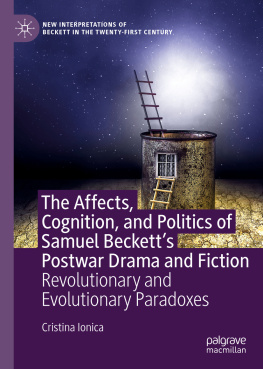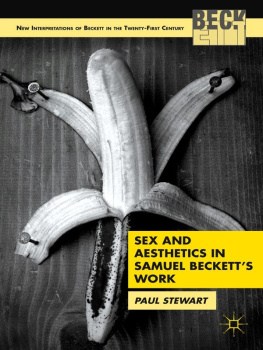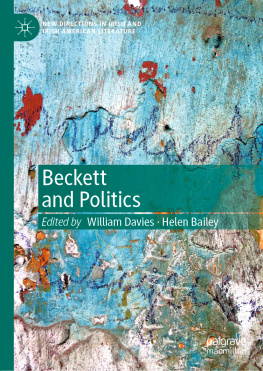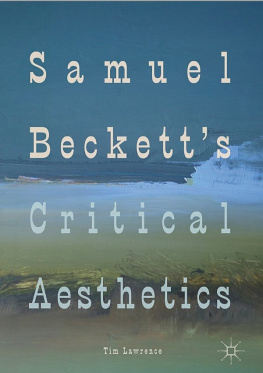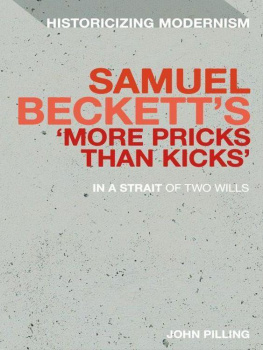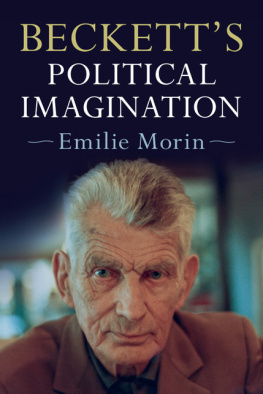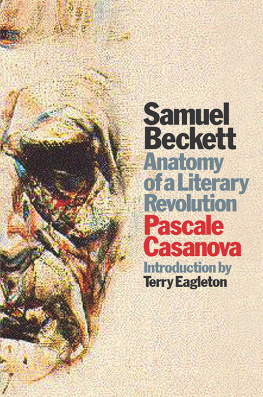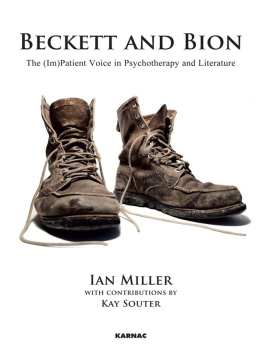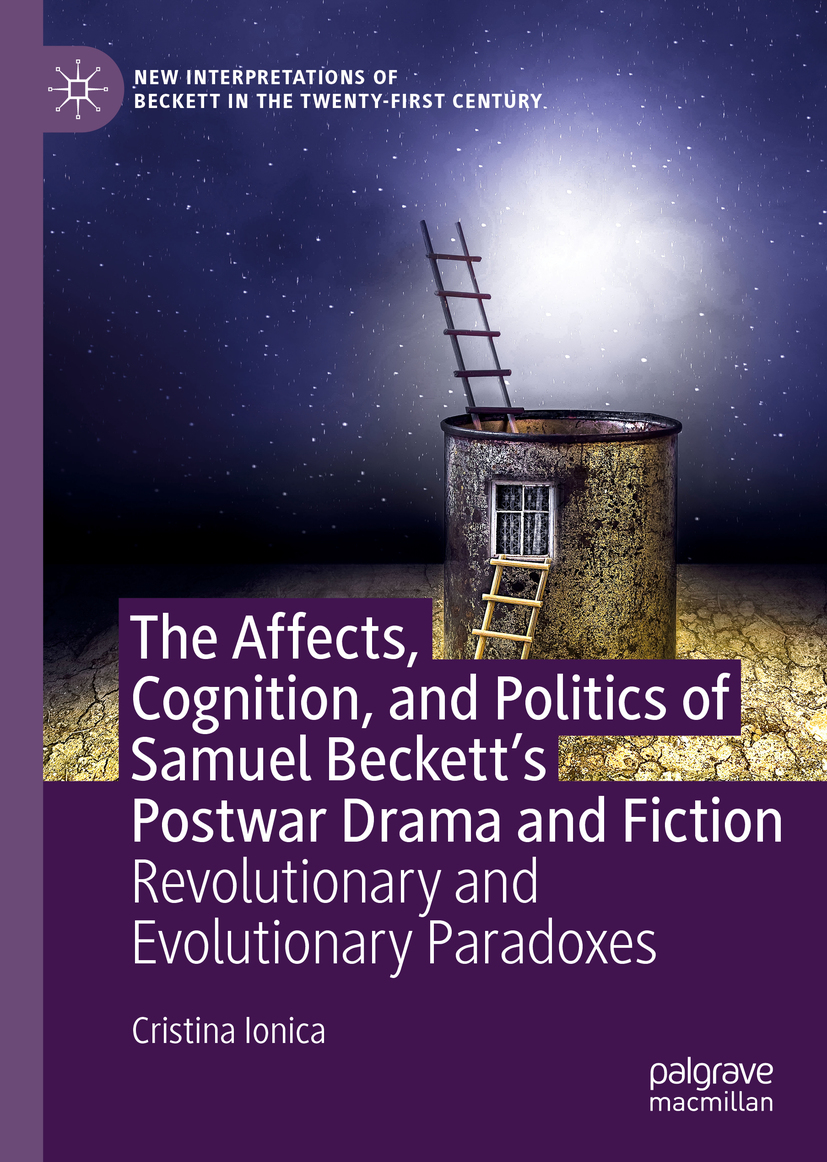New Interpretations of Beckett in the Twenty-First Century
Series Editor
Jennifer M. Jeffers
Department of English, Cleveland State University, Cleveland, OH, USA
As the leading literary figure to emerge from post-World War II Europe, Samuel Becketts texts and his literary and intellectual legacy have yet to be fully appreciated by critics and scholars. The goal of New Interpretations of Beckett in the Twenty-First Century is to stimulate new approaches and develop fresh perspectives on Beckett, his texts, and his legacy. The series will provide a forum for original and interdisciplinary interpretations concerning any aspect of Becketts work or his influence upon subsequent writers, artists, and thinkers.
More information about this series at http://www.palgrave.com/gp/series/14737
Cristina Ionica
The Affects, Cognition, and Politics of Samuel Becketts Postwar Drama and Fiction
Revolutionary and Evolutionary Paradoxes
Cristina Ionica
Fanshawe College, London, ON, Canada
New Interpretations of Beckett in the Twenty-First Century
ISBN 978-3-030-34901-1 e-ISBN 978-3-030-34902-8
https://doi.org/10.1007/978-3-030-34902-8
The Editor(s) (if applicable) and The Author(s), under exclusive license to Springer Nature Switzerland AG 2020
This work is subject to copyright. All rights are solely and exclusively licensed by the Publisher, whether the whole or part of the material is concerned, specifically the rights of translation, reprinting, reuse of illustrations, recitation, broadcasting, reproduction on microfilms or in any other physical way, and transmission or information storage and retrieval, electronic adaptation, computer software, or by similar or dissimilar methodology now known or hereafter developed.
The use of general descriptive names, registered names, trademarks, service marks, etc. in this publication does not imply, even in the absence of a specific statement, that such names are exempt from the relevant protective laws and regulations and therefore free for general use.
The publisher, the authors and the editors are safe to assume that the advice and information in this book are believed to be true and accurate at the date of publication. Neither the publisher nor the authors or the editors give a warranty, expressed or implied, with respect to the material contained herein or for any errors or omissions that may have been made. The publisher remains neutral with regard to jurisdictional claims in published maps and institutional affiliations.
This Palgrave Macmillan imprint is published by the registered company Springer Nature Switzerland AG.
The registered company address is: Gewerbestrasse 11, 6330 Cham, Switzerland
Abbreviations
Referenced Work | Abbreviation |
|---|
Beckett, Samuel.The Complete Dramatic Works. Faber and Faber, 1986. | CDW |
.The Complete Short Prose, 19291989. Edited by S.E. Gontarski. Grove, 1995. | CSP |
.How It Is. John Calder, 1996. | HII |
.The Letters of Samuel Beckett. Edited by George Craig, Martha Dow Fehsenfeld, Daniel Gunn, and Lois More Overbeck. Cambridge UP, 200916. 4 vols. | L1; L2; L3; L4 |
.Malone Dies. Edited by Peter Boxall. London: Faber and Faber, 2010. | MD |
.Molloy. Edited by Shane Weller. London: Faber and Faber, 2009. | M |
.Nohow On: Company. Ill Seen Ill Said. Wostward Ho. John Calder, 1989. | NO |
.Watt. John Calder, 1963. | W |
.The Unnamable. Edited by Steven Connor. London: Faber and Faber, 2010. | U |
Deleuze, Gilles.The Logic of Sense. Translated by Mark Lester with Charles Stivale, edited by Constantin V. Boundas. The Athlone Press, 1990. | LS |
Deleuze, Gilles and Flix Guattari.Anti-Oedipus: Capitalism and Schizophrenia. Translated by Robert Hurley, Mark Seem, and Helen R. Lane. U of Minnesota P, 1983. | AO |
.Kafka: Toward a Minor Literature. Translated by Dana Polan, U of Minnesota P, 1986. | K |
.A Thousand Plateaux: Capitalism and Schizophrenia. Translated by Brian Massumi, U of Minnesota P, 1987. | TP |
Acknowledgements
First, I would like to thank my former Western University professors Thomas Carmichael, Martin Kreiswirth, Allan Pero, and Peter Schwenger, whose support of my ideas has been unwavering over the years. Tom, thank you for your generous feedback on so many academic article drafts, including the article (published inAngelaki) in which my ideas on Becketts paradox-based discourse first started to crystallize. Marty, thank you for introducing me to cognitive narrative theory and for supporting my academic progress and my work on this project throughout the years, even after you left Western to take on a new position at McGill. Allan and Peter, thank you for seeing something of value in my perspective on Becketts work with the absurd and for encouraging me to pursue this project on many occasions when I feared I had reached a dead end. Your trust in my academic abilities has meant more to me than you could ever know.
I am grateful to the Palgrave peer reviewer for pointing out several ways to strengthen my argumentation in Part I, and to the editorial team (the series editor, Jennifer M. Jeffers, and the editor and editorial assistant, Allie Troyanos and Rachel Jacobe) for their investment in my project and support in bringing my ideas to their final form. I would also like to thank the design and production team Friedhelm Steinen-Broo (eStudioCalamar), Tikoji Rao and Brian Halm (Springer Nature), and Divya Anish and Sylvia Anand (SPi Technologies) for their careful and patient management of the design and production process.
Some of the arguments developed in the Introduction and in Part I of this book are based on ideas originally presented in my article Halting the Production of Repression: Deleuze, Guattari, Beckett, and the Schizos Stick, which appeared inAngelaki: Journal of the Theoretical Humanities, vol. 21, issue 2, 2016, pp. 99118. I would like to thank the general issue editor, Salah el Moncef bin Khalifa, and the journals anonymous reviewer for their feedback and encouragement.
My partner Claudiu and my closest friends Gianina, Duru, and Amandathank you for your emotional and intellectual presence in my life during the writing of this book. Our conversations always gave me new ideas and propelled my work forward.
My Fanshawe College and Western University colleagues friendship and encouragement has taken me through many difficult moments during the last few years. Thank you, Amy, Aaron, Jeff W., Jeff D., Brian, Mel, Curtis, and Lindsay.

